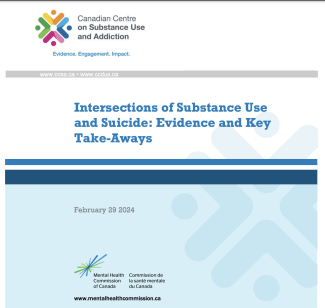Intersections of Substance Use and Suicide: Evidence and Key Take-Aways.

Specific patterns of substance use have been found to correlate with an elevated risk of suicidal thoughts, attempts, and mortality by suicide. However, this relationship is multifaceted and influenced by various intersecting factors, including the type and quantity of substances consumed, as well as biological and social determinants. The Canadian Centre on Substance Use and Addiction, in collaboration with the Mental Health Commission of Canada, presents a comprehensive examination of these factors in their latest report titled "Intersections of Substance Use and Suicide: Evidence and Key Take-Aways."
Key highlights from the report include:
- Co-occurring mental illness and substance use disorders markedly heighten the risk of suicidal thoughts, attempts, and fatalities by suicide.
- The link between substance use and suicide risk appears to be influenced by consumption levels, with acute use demonstrating an increased risk of suicide. While this association is more established with alcohol, it remains less clear for other substances.
- There is an observed elevated risk of suicide during substance use treatment and within the 12 months post-treatment completion. Healthcare providers' vigilant screening for suicide risk during this period is paramount.
Furthermore, the report underscores that certain demographic groups, such as men and older adults, face a heightened risk due to overlapping health and social disparities, including trauma, co-occurring disorders, stigma, and barriers to accessing healthcare.
